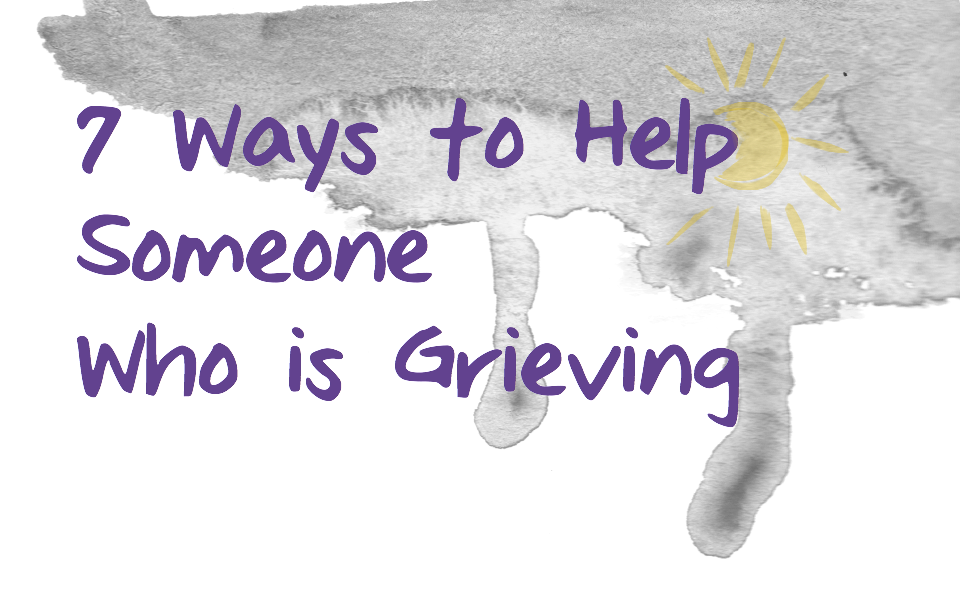7 Ways to Help Someone Who is Grieving
This is the fifth (and final) post in a series this past week in honour of the three year anniversary of my sister Jocelyn's death. I'll share writing from a variety of places (old blog posts from here, from other personal blogs, writing never shared), but all things that I've written about her death and my grieving. While not the most cheerful stuff to read about, my writing about losing her has been pivotal in my healing process. Thanks for allowing me to share with you this week!
This post is one of the most popular on my blog, so may be familiar to many of you here. I've updated it a bit for clarity now that it's been a few years.
----------------------------------------
ALSO... please don't feel like this is a mandatory list of must-do's either! This is simply a list to refer to if you are desperate to help and need ideas.
7 Ways to Help Someone Who is Grieving
1) Reach out. Just do it.
Whether there's awkwardness between you, it's been a while, or you think you have nothing to say, just reach out anyways. I was so touched when people I hadn't heard from in forever cared enough to reach out to me with a simple "I'm so sorry to hear" or "thinking about you." Tragedies have a way of making all the distances between hearts disappear.
2) You don't need to make them feel better.
This one is tricky to explain out-loud, so bear with me.
There is nothing that you can say that will make them feel better right now. Nothing. What they are going through is just 100% crappy and that is it. The end. It is just hard and it hurts, regardless of anythinganythinganything. Reminding them of their beliefs in an after-life, saying someone is in a better place, telling them anything that starts with "at least...", or anything else that is intended to lessen the pain is off-limits. For now, at first. Let them take the lead on seeing whatever silver lining they can, when they're ready...and, even then, maybe just listen and nod.
People are so good and caring and kind...and it's only natural to want to cheer someone up! One of the (many!) things that surprised me about experiencing the loss of a loved one was how little I wanted people to make me feel better...like, not at all. When you try, you run the risk of trivializing their pain, and coming across like you're trying to make it not-such-a-big-deal...even though that is not your intention at all, I know.
With all that said, however, the effort to be kind was always appreciated, on some level...so (as a disclaimer) don't feel so stressed about saying the "right" thing, that you end up saying/doing nothing at all.
3) Validate
So maybe you can't make them feel better, but you can validate how they must be feeling right now. Defend and protect their right to be in agony, and let them know that however they're feeling is okay. Do give your condolences, tell them how you can't imagine how hard this must be, let them know you're thinking of them...anything, really, that will let them know that yes, this is awful, and you love them.
4) Give Specific Help
...instead of offering the too-general "if there's anything I can do...." (which we are ALL guilty of!) If you really want to help somehow, just do something. Don't necessarily rely on the person grieving to tell you what they need because 1) It's hard to even fathom exactly what you need when everything aches...and 2) When you experience a great loss, ALL of the normal things like eating, showering, parenting are overwhelmingly difficult and exhausting! It's really the little, day-to-day things that help the most. Take them a meal. Mow their lawn. Steal their kids for a couple hours. Bring them a movie you know they'd like. Give them a bath bomb and tea. Send them a gift card for some guilt-free retail therapy...or a restaurant so they don't have to make food themselves. Go clean their bathroom, or send a cleaning service over. Bring them a bag of groceries. Drop a favourite chocolate bar in their mailbox. Anything is something.
5) Keep Reaching Out...But With No Expectations
Send them a note that doesn't necessitate a reply. Stop by with a treat, but don't expect them to visit and chat like usual. Keep sending love out even if it seems there is nothing coming back for a while. Invite them for a walk, for dinner, for hot chocolate...but understand if they decline. And keep inviting them anyways, no pressure. They need the reassurances that they have all the space they need, but they are also not forgotten.
6) Support Healthy Mourning
Grief and mourning are different, I've learned. Grief is your ailment, mourning is how you deal with it or "let it out." Mourning is essential to learning to live with grief in a healthy way, to healing. Allow and encourage the person grieving to talk about it, cry about it, just sit with the pain, feel it. Support things like music, writing, creative projects, running, tributes in honour of the person lost, goals made in the wake of new realizations, etc....anything that allows the person to "let it out" in a healthy way and/or acknowledge the person who's loss they are mourning.
I know some of us are uncomfortable when people cry in front of us...feeling like we've ruined everything, that it's an intensely meaningful moment we are unprepared for, or (because we asked them about it) it's our fault they're sad...but chances are that they've cried so much already, it's not weird to them anymore (you know, like how when you have a baby, you get over the embarrassment of people looking between your legs real fast? Like that.). So you don't need to feel weird either. Just let them get a few tears out, without making it into a big deal, or trying to fix it, or feeling stressed like this means you are the only person they can trust now, or ever. Just be there and let them feel what they're feeling.
It's also okay if they are okay. Losing someone is difficult, but some are just better equipped to handle the fallout. And that is okay.
7) Be patient
Grief and mourning are not just emotional burdens; they actually have mental and physical symptoms/side effects as well, like fatigue, short-term memory issues, attention and focus difficulties, etc. They are processing something HUGE, and that takes a lot of physical resources and energy.
Most people are resilient and get through the worst of it okay, so take heart. However, some spiral into longer-term issues like depression and anxiety (especially if the loss is not dealt with in healthy ways or bottled up)..and even something called "complicated grief" which may require professional counselling to get through. Grief never goes away, though the waves do become less intense over time. You just learn how to live with it...and it takes longer for some than others. Let your person have their time.



Comments
Post a Comment